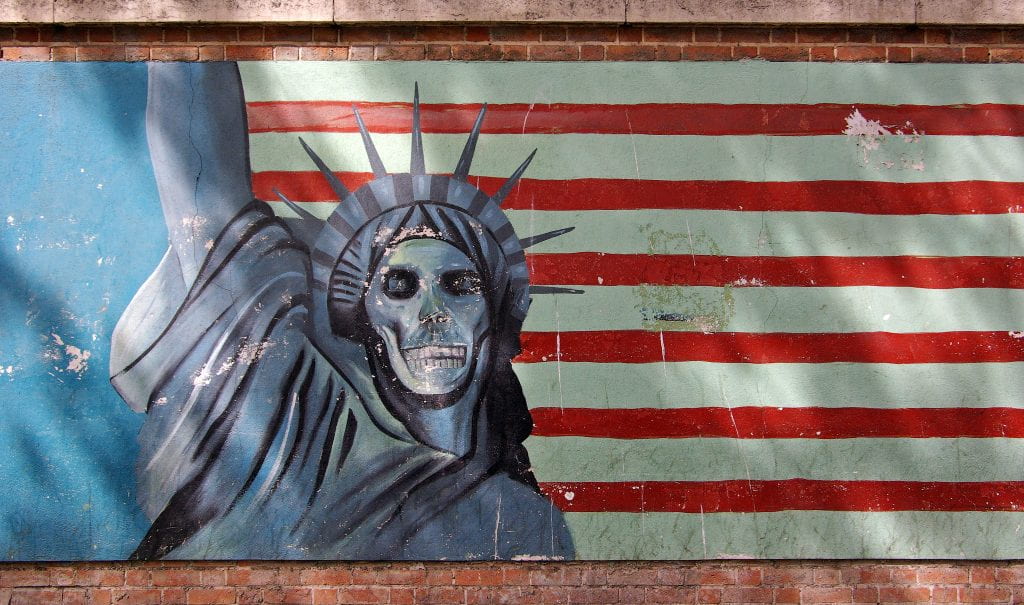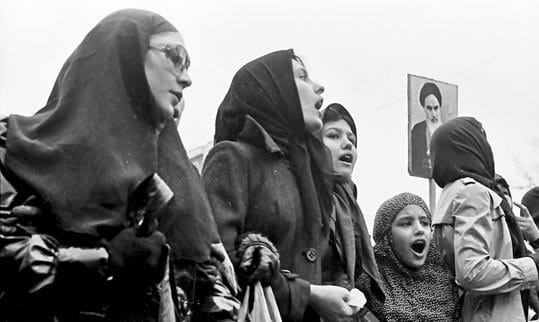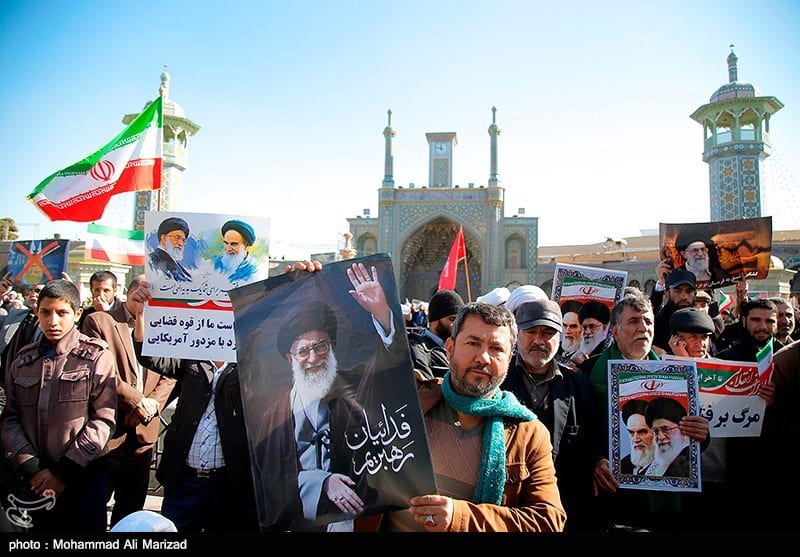
Throughout his work, the Iranian poet and academic Hasan Honarmandi vividly illustrated the predominant Iranian view of the West in the wake of the Islamic Revolution of 1979. In his poem The West is Fast Asleep, Honarmandi claimed “[f]rom the land of glitter all happiness has left / Chains abound, but of faith it is bereft / Naught but numbers fill the Western brain / For joy without anxiety you’ll search in vain / […] No longer has the West a message to convey.” Yet in his own life, the poet failed to take heed of his own message, succumbing to the mind-numbing alienation and atomization he associated with Western modernity. After moving to Paris to continue his studies, Honarmandi, “who never married and lived in a small apartment”, “committed suicide by ingesting sleeping pills and drinking cognac,” forever doomed to slumber in the West.
With the arrival of Ayatollah Khomeini at Tehran’s Mehrabad Airport on the first of February 1979, Iranians believed they successfully defeated the symptoms of modernity to which Honarmandi surrendered. Although many rose up against the monarchical regime of the Shah in protest of its “corruption, repression, despotism, and the plight of the disenfranchised,” the vast majority of the millions of ordinary Iranians from every walk of life that greeted Khomeini upon his return rose up in opposition to the same concepts of modernity condemned by Honarmandi:
As the Shah fled from country to country after the collapse of his regime, Khomeini victoriously proclaimed the establishment of the Islamic Republic of Iran, which would exist in a “permanent state of revolutionary fervor” deemed necessary to ward off “cultural imperialism and […] ‘ethnocide’ at the hands of their Western adversaries.” Khomeini ultimately received his wish, although presumably not in the manner in which he originally intended. Since the Islamic Revolution of 1979, the Islamic Republic of Iran continually suffers from protests, such as those in 1999, 2003, 2006, 2007, 2009, 2011, and now in 2017-2018. In all of these instances, the Iranian government employed physical force – ranging from rubber bullets and water cannons to armed militias and counter-protestors – against its domestic detractors, often resulting in deaths and always drawing swift condemnation from its Western peers. However, where the West observes a government violating its citizens’ human rights, the Iranian leadership and its supporters genuinely believe “some Western countries intended to impose on other societies their own social ethical decline, to which they themselves confess, within the attractive package of human rights.”
Ultimately, the differing perspectives of the Islamic Republic and the West demonstrate a crucial question facing the human rights community: Are human rights, in fact, universal? Or, do they differ based on history, culture, and other factors?

“No longer has the West a message to convey”
At its very essence, the Western conception of human rights contends such rights apply to all humans, regardless of nationality, ethnicity, religion, gender, or creed. But what if a society rejects core aspects of this conception? If a large enough segment of the human population expresses opposition to many of these rights, can the Western conception of human rights legitimately be referred to as “human” rights? Indeed, at its core, the ongoing conflict between the United States and Iran represents a struggle between two, often-contradictory, worldviews.
In the years prior to 1979, the West – in the eyes of many Iranians – sought to impose its worldview on Iran through the Shah, who, for all intents and purposes, served as a Western puppet. Their White Revolution promoted the abolition of the veil, suffrage for women, Western-style judicial and education systems, and neoliberal economic reforms, among other supposed hallmarks of modernity. As noted by Ali Mirsepassi, this resulted in:
From the very beginning, therefore, the Islamic Revolution represented a categorical rejection of Western values by the people of Iran. Although the majority of the revolution occurred relatively peacefully, protestors regularly assaulted symbols of Western culture, such as alcohol stores and movie theaters. This opposition to Western modernity continues in the Islamic Republic to the current day, according to Seyed Hossein Mousavian and Shahir Shahidsaless, who observe:
On one hand, the conservative viewpoint, espoused by figures such as Supreme Leader Khamenei, essentially subscribes to the clash of civilizations theory, contending culturally and ethnically distinct civilizations (i.e. the West, Asia, the Middle East, and so on) will naturally conflict with one another as globalization brings these civilizations into greater contact with one another during the twenty-first century. This political faction, known as the Principalists, view Western Modernity and Islam in terms of an irreconcilable dichotomy – one can possess their “variant and traditional familial, tribal, ethnic, religious, and national identities/attachments” or one can possess “the tediously monotonous materialism of the present age.”
On the other, the moderate viewpoint, as championed by current Iranian President Hassan Rouhani, believes in a world organized along the idea that societies and cultures should remain separate, but ultimately equal, based on qualities such as mutual respect and non-interference in one another’s domestic affairs. However, unlike the conservative school of thought, the Reformists do not perceive the necessity of conflict between cultures – instead, they stress emphasizing commonalities in order to minimize conflict between Islamic and non-Islamic societies.
Despite their nominal opposition to one another, these Iranian schools agree on a crucial point – both reject the universal conception of human rights as “the Trojan horse of the powerful West.” Indeed, “every political faction in Iran, including moderates,” believes that the West employs human rights, economic sanctions, and other elements of its soft power “either to change the nezam’s identity and impose Western values, or to completely topple it and replace it with a puppet state.”

“The West which itself is helpless now, in a torture test”
While the Islam of the Iranian Revolution seeks to “export the revolution” throughout the Middle East, Western liberalism seeks to force its values – including its particular conception of human rights – on the rest of the world. Countries must possess liberal democracy – the choices of the voters, without which democracy does not exist, do not matter if they choose illiberal democracy. The constant attempts to undermine the Islamic Republic illustrate this fact, as does Western support for the military coup against President Morsi of Egypt and European Union threats to sanction Poland over its judicial reforms. Countries must accept the Western conception of human rights or potentially risk a politically motivated, “humanitarian” intervention.
Both Western liberalism and the Islamic Republic – despite their apparent antagonism – exhibit a similar drive towards universalizing their values; however, they also possess drastically different conceptions of values and the world. Different values necessarily result in different conceptions of human rights, especially when “both sides also claim to be champions of universal values, justice, equality, and dignity.”
Ultimately, these arguments weaken the underlying assumption that human rights are universal. Critics of this viewpoint suggest the universality of human rights emerges from the various international documents that codify such rights. Yet this ignores the fact that Westerners – specifically, the Western liberal political elite – overwhelmingly participated in the drafting of these documents. Furthermore, the conception of these documents served an explicitly political purpose – buttressing the post-war, liberal world order as conceived by President Roosevelt and American planners. The Universal Declaration of Human Rights played a direct role in crafting the appearance of universality for the Western conception of human rights.
Throughout history, political systems and values developed slowly – city-by-city, region-by-region, and nation-by-nation– over the course of several thousand years. The true radicalism of the modern, Western-conceived human rights regime lies in its attempt to ignore this fact, imposing its rules on the entirety of the globe in barely seven decades. Seeing as many countries only recently received independence from the last Western attempt to impose its values on the world, it should not surprise that many possess little appetite for this latest iteration of Western universalism.
The solution lies in what Guillaume Faye refers to as the “Autarky of Great Spaces” and Samuel Huntington denoted as “civilizations.” Rather than jumping directly from the nation to the globe, this solution calls for the implementation of human rights regimes at the level of civilizational blocs (i.e., Europe, Eastern Asia, Sub-Saharan Africa, MENA, etc.) as an intermediate step. As observable in the Western culture wars and the Iranian-Saudi proxy wars throughout the Middle East, even within civilizations – “defined by common objective elements, such as a language, history, religion, customs, institutions, and by the subjective self-identification of people” – there exist significant divides; therefore, the attempt to engineer a universal, human rights philosophy without intermediary steps towards practical implementation and the negotiation of wide cultural differences represents putting the cart significantly before the horse.
The term “autarky” refers to the idea that “only those things that cannot be produced domestically [by a country] are imported.” Although Faye, as well as most others, employs it in a purely economic sense, autarky also makes sense in terms of values and culture. Different civilizations possess similar core values, yet differ on the implementation and applicability of these values– hence, the clash of civilizations over these values as globalization increases contact between them. Ultimately, these should serve as the basis for the human rights regime of each civilization or Great Space.
For the conflict between the West and Iran, such a human rights philosophy promises to reduce conflict for various reasons:
1) This regime acknowledges human diversity, both in opinion and in culture. Thus, both the West and Iran receive independence in crafting their own, culturally relevant human rights systems.
2) The principles of mutual respect and non-interference in one another’s domestic affairs – often specifically demanded by Iran and other non-Western nations – serve as key components. Emphasizing these principles also addresses non-Western concerns regarding the selectivity the West displays in terms of its use and endorsement of humanitarian intervention.
Only once the intra-civilizational divides on values and human rights reach a sufficient conclusion can inter-civilizational divides hope to receive adequate attention and a truly universal human rights regime formulated. Ultimately, the implementation of this human rights regime could serve as a veritable Peace of Westphalia for human rights.
